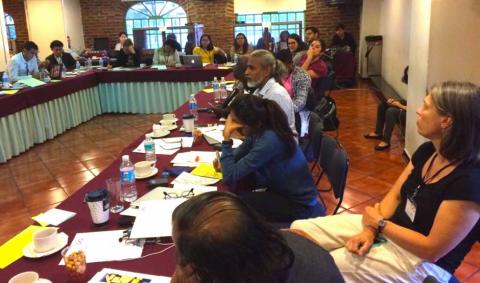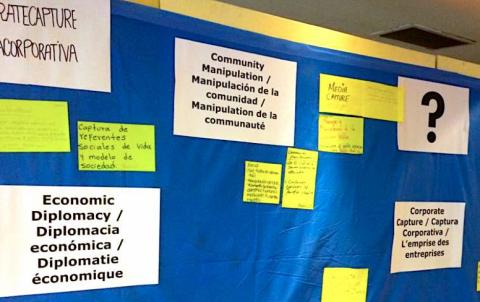
Members gathered in Mexico develop a strategic plan for the Corporate Capture Project
From 29-31 August 2017, some 25 members of ESCR-Net—social movements and NGOs from around the world—gathered in Mexico City, to develop a strategic plan for the next two years of the Corporate Capture Project of the Corporate Accountability Working Group (CAWG).
The meeting was guided by the Project Advisory Group (PAG) of members: Above Ground (Canada), PODER (Mexico), SiLNoRF (Sierra Leone), Defend Job (Philippines), CNS (India) and Habi Center (Egypt), who have led this project over the past two years. On the first day, ESCR-Net’s Board Chair, Francisco Rocael (Consejo de Pueblos Wuxhtaj, Guatemala) situated the importance of the meeting in the global nature of corporate capture confronting communities in every region, undermining community control over resources and wider public interest. After an overview of initial activities and project outcomes, three case studies were shared by members to explore the current definition and manifestations of corporate capture outlined by the project, with Mining Watch Canada focusing on economic diplomacy, SiLNoRF on community manipulation and APRODEH on legislative interference of mining companies. Other two cases, presented by Terra de Direitos and CNS, foregrounded civil society efforts to confront corporate capture, challenging judicial interference in the Brazilian Judiciary System and blocking corporate involvement in public health policy and related partnerships via the Framework Convention on the Tobacco Control.
This project emerged from member discussions at earlier ESCR-Net Peoples’ Forums on Human Rights and Business and was concretized two years ago at an initial strategy meeting in Mexico City, which was also co-hosted by PODER. At that meeting, the PAG articulated an initial definition: “Corporate capture refers to the means by which an economic elite undermine the realization of human rights and the environment by exerting undue influence over domestic and international decision-makers and public institutions,” as well as beginning to outline its specific manifestations based on cases of members and allies, including: community manipulation, economic diplomacy, judicial interference, legislative and policy interference, privatizing public security services, and revolving door practices.
Group discussion at this meeting further deepened common analysis of corporate capture and its diverse manifestations, for instance drawing attention to corporate social responsibility projects as a form of community manipulation, participants highlighted attempts by corporations acquire a “social license to operate” through community-development projects, at times in partnership with NGOs, offering short-term benefits often to mask long-term harms. Members also highlighted the corporate manipulation of the media, influencing the dominant narratives of progress and development, justifying both the privatization of essential public services and the use of public resources—via tax subsidies or polices, support from export credit agencies or other forms of public finance—to further the private interests of corporate actors. Members further noted the role of corporations funding studies and academia more broadly, which was identified as corporate capture of science and public education institutions. In continuing to deepen collective analysis, there was also recognition of the need to be attentive to context, particularly situations of conflict zones and occupation.
Corporate capture was then identified as one of the common global conditions threatening communities around the world in the Common Charter for Collective Struggle, initially developed by the Social Movement Working Group and affirmed by all members present at the 2016 ESCR-Net Global Strategy Meeting. This current meeting positioned CAWG to help guide and contribute to network-wide actions to confront corporate capture in the coming period, ensuring that the demands, analysis and narratives of social movements and communities are at the center of the strategy.
During the strategy meeting participants envisioned the main changes they want to see in the upcoming years. A push for strengthening civil society to confront corporate capture and reclaim public interest was one of the main aims, shifting wider public narratives and unveiling the true nature of corporations, which have the core purpose and ultimate goal of making profit for a few not securing human rights for all. On the second day, members broke into three groups to deepen analysis and begin exploring concrete reactions related to popularization and alliance building, community-led documentation and mobilization, and model legislative and policy reforms. On the final day, these discussions came together to shape coordinated advocacy and campaigning over the next couple years. Groups of members committed to collective work on five main areas of action: revising manifestations of corporate capture, refining policy analysis and asks, documenting successes and lessons (including several that emerged during the gathering), popular communication materials on manifestations, and tools and courses for community-led documentation. Members also committed to individually and collectively utilizing a series of openings and events over the coming year to foreground corporate capture and advocate concrete change. For instance, members are planning public events at the upcoming UN Intergovernmental Working Group session tasked with drafting a treaty on human rights and business, as well as the UN Forum on Human Rights and Business, and articulating a common advocacy position on corporate capture and the treaty. There was also a strong push to strengthen mobilization and campaigning, for instance supporting members to build awareness and support the action of thousands of small farmers involved in the West African Caravan on Land, Water & Seeds. This included discussion of how to advance a network-wide campaign and action, including via a global day of action in mid-2018.

